#Sir Topham Hatt is coming for your money
Text
Sir Topham Hatt is a BILLIONAIRE?!
Ok, so I just discovered this, and I was wondering if anyone else had discovered this - but apparently the Fat Controller is richer than Mr Burns according to Forbes magazine?! And he's worth $2 Billion USD, for his massive railway empire, vintage locomotive collection and real estate holdings.
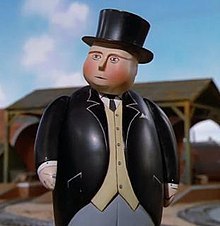
Ok, I'm sorry - but Sir Topham Hatt is worth more than Rihanna, and to make matters even more interesting - $2 billion is what Forbes pegged his worth at in 2010 (and then continuously to today, where he still is amongst the 15 wealthiest fictional characters according to Forbes).
What's the betting he's worth more now? The Thomas and Friends franchise has made approximately $9.12 billion USD in its lifetime - putting it on par with Jurassic Park, Angry Birds and Dragon Ball in worth, and meaning that the little blue tank engine is worth more than Mario. Are you saying Sir Topham wouldn't have invested in this media juggernaut? Not to mention the fact that as an industrialist and transport tycoon who has a monopoly on transport on and off the famed Island of Sodor, he probably makes a ridiculous amount of money every year from tourism.
And that's before we mention that one little fact that his family is intertwined with all the other major players on the island, including the Earl, the Viscount, the Brown family (Skarloey Railway) and the Croarie family (Anopha Quarry). So the Hatt name has several other prominent families backing it.
Does this make Sodor an oligarchy? The Brown family is a political dynasty with a railway, the Croarie family owns the largest quarry on Sodor (if not possibly England, seeing as its still running, 100 years on), the Norramby family holds an Earldom, the Regaby family is both part of the railway and holds a Viscountcy, and the Hatt family runs a transport empire, which includes all the major ports on the island, as well as holding a Baronetcy.
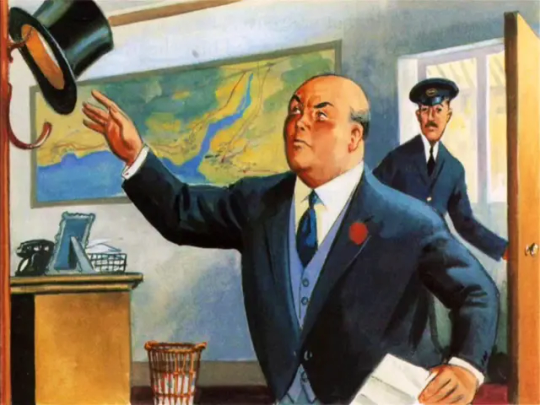
Um... so Sir Topham Hatt might actually be worth even more than he's listed as owning? Cause I talked about all of this without mentioning the Sodor Aluminium Company, which the NWR owns a sizeable stake in.
The Hatt Family is making bank off mineral wealth, manufacturing, transport, tourism, real estate, generational wealth and tourism. And all this with a vintage fleet of steam engines (which only add to his net worth, due to their rarity and star-value).
So, uh... how do I get in on this?
#railway series#weirdowithaquill#thomas the tank engine#railways#sir topham hatt#Forbes billionaire Sir Topham Hatt#forbes magazine#fictional billionaires' list#rambles#When I woke up today I did not expect to discover that Forbes Magazine rated the Hatt family as one of the richest in the fictional world#Sir Topham Hatt is coming for your money#The Sodor Oligarchs
55 notes
·
View notes
Text
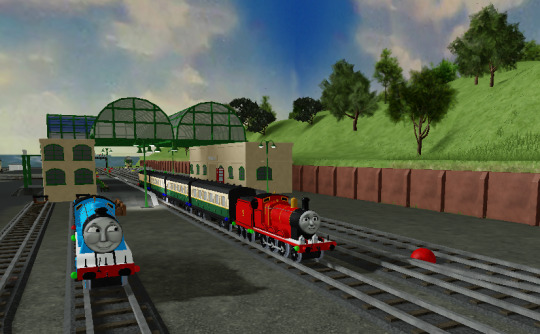
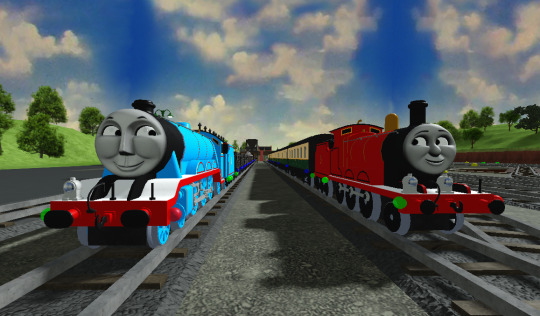
Thomas and Friends: Sodor Online Journeys (Story 10): James and The Express/James's Day Out
Sometimes, Henry and Gordon would often sleep with James. Although, the Fat Controller/Sir Topham Hatt wasbeginning to agree with him, whenever a chance came, they would talk about nothing but bootlaces! "Remember the time one had to be used to get you out of trouble, James?/Remember the time they had to use a bootlace to get you out of trouble, James?" they would tease. James would talk about engines who got shut up in tunnels, and stuck on hills, but they wouldn't listen./James would talk about Henry who got shut up in tunnel, and Gordon who stuck on a hill, but they wouldn't listen. "You talk too much, little James," Gordon would say. "A fine strong engine like me has something to talk about. I'm the only engine who can pull the Express. When I'm not there, they need two engines. Think of that! I've pulled expresses for years, and have never once lost my way. I seem to know the right line by instinct," said Gordon proudly.
Every wise engine knows, of course, that the signalman works/sets the points/switches to make engines run onto the right lines, but Gordon was so proud that he had forgotten. "Wake up, James," said Gordon one morning, "it's nearly time for the Express. What are you doing? Odd jobs? Ah well! We all have to begin somewhere, don't we? Run along now and get my coaches. Don't be late now." James went to get Gordon's Coaches.
They were now all shining with lovely new paint. He was careful not to bump them, and they followed him smoothly into the station singing happily. "We're going away, we're going away." "I wish I was going with you," said James. "I should love to pull the Express and go flying along the line." He left them in the Station just as Gordon with much noise and blowing of steam got ready to back down on to the train. The Fat Controller/Sir Topham Hatt was on the train with other important People, and, as soon as they heard the guard's/conductor's whistle, Gordon started. "Look at me now! Look at me now!" he puffed, and the coaches glided after him out of the station. "Poop poop poo poo poop! Goodbye, little James! See you tomorrow." James watched the train disappear around the curve, and went back to work.
He pushed some trucks/freight cars into their proper sidings, and went to fetch the coaches for another train.
James had just brought the coaches to the platform, and was just uncoupled when he heard a mournful noise. And there was Gordon trying to sidle/sneak into the station without being noticed. "Hullo, Gordon! Is it tomorrow?" asked James. Gordon didn't answer; he just let off steam feebly. "Did you lose your way, Gordon?" asked James again. "No, it was lost for me," answered Gordon, "I was switched off the main line on to the loop; I had to go all round and back again." "Perhaps it was instinct," said James brightly. Meanwhile all the passengers hurried to the booking office/ticket window. "We want our money back," they shouted. Everyone was making a noise, but the Fat Controller/Sir Topham Hatt climbed on a trolley/cart and blew the guard's/conductor's whistle so loudly that they all stopped to look at him. Then he promised them a new train at once. "Gordon can't do it," he said. "Will you pull it for us, James?" "Yes, sir, I'll try." So James was coupled on and everyone got in again. "Do your best, James," said the Fat Controller/Sir Topham Hatt kindly. Just then the Guard/Conductor blew his whistle and he had to run to get in. "Come along, come along!" puffed James. "You're pulling us well! You're pulling us well!" sang the Coaches. "Hurry, hurry, hurry," puffed James again. Stations and bridges flashed by, the passengers leaned out of the windows and cheered, and they soon reached the terminus. Everyone said "Thank you" to James, and the Fat Controller/Sir Topham Hatt was proud of him. "Well done," said the Fat Controller/Sir Topham Hatt. "Would you like to pull the Express sometimes?" "Yes, please," answered James happily. "Only if it's alright with Gordon."
Next day when James came by, Gordon was pushing trucks/freight cars in the yard. "I like some quiet work for a change," he said. "I'm teaching these trucks/cars manners. You did well with those coaches I hear…good, we'll show them!" and he gave his trucks/cars a bump, making them cry, "Oh! Oh! Oh! Oh!" James and Gordon are now good friends. James sometimes takes the Express to give Gordon a rest. Gordon never talks about bootlaces, and they are both quite agreed on the subject of trucks/freight cars!
Story End
0 notes
Note
Have any thoughts on Dennis? (fair warning: I'm already getting a little obsessed with him, and if your answer is *too* good I might nick your ideas for Ex-Condor. you know. with credit. respectfully!)
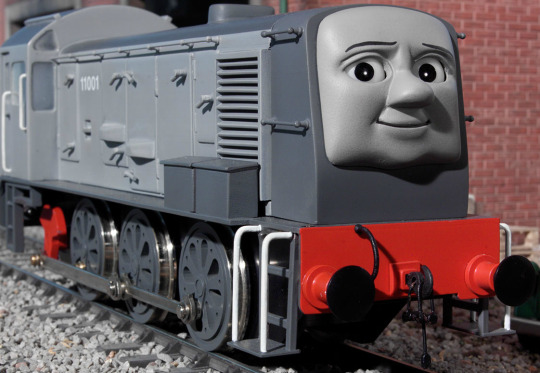
Behold, a unit.
I honestly hadn’t until this ask of yours! But now I wanna give it my all. So, here goes!
I’m just gonna start off by saying it’s wrong of Dennis to carry the number 11001. For the rest of this post, just ignore it, and assume he’s “11002.”
In 1949, Ashford Works outshopped two diesel-mechanical locomotives, which became British Railways’ 11001 and 11002. They had been designed by the famous (and in many circles, infamous) Oliver Bulleid of the former Southern Railway. By 1949, Bulleid was in hot water with the young British Railways and the public in general for his reputation as a spendthrift who got his imagined locomotives built by dubious means. His Pacifics had been built during the war under the notion they could be mixed-traffic, (this was VERY untrue,) and his ongoing “Leader” development scheme was riddled with teething problems, all of which were built to the taxpayer after nationalization. It was under this cloud of scandal that 11001 and 11002 entered service.
The two unnamed brothers lived primarily at Norwood Shed, south of London. If they were to have further siblings built, they were intended for shunting duties and slow freight trains, undoubtably replacing tank engines in this current niche. Historians have failed to agree, but ‘01 and ‘02 are likely the first diesel locomotives built for British Railways, main line or otherwise. No further examples were built, however.
Growing up at the turn of the Fifties, ‘01 and ‘02 would have been absolutely surrounded by steam engines, who found them more amusing than a threat to themselves. British Railways was still running at a surplus, and there were plans for hundreds of steam engines of their own designs to be built in the coming years. Therefore, ‘01 and ‘02 were tolerated and even befriended by their steam coworkers. That would change, harshly.
January 1955. Word had gotten around among engines about a White Paper put together by the Government a month earlier. British Railways’ small profits at the beginning of the decade were gone. The company was now running at a deficit, costing more to run than what money it generated. The Government decided that to reverse this deficit by 1962, it would enact what it called its ‘Modernization Plan.’ The plan called for massive investments into the railway network and its rolling stock, to improve their competitiveness against the roads and win back lost clientele. This involved, among several other proposals, the wholesale replacement of steam engines with diesels and several main lines being electrified.
All eyes fell now on ‘01 and ‘02. They didn’t have a single steam friend in their corner now, and were treated not as friends but as enemies who had snuck in years earlier with this plan in mind the whole time. This obviously wasn’t true, but the steam engines were paranoid and powerless to stop what the company planned to do. The only course of action left, according to many steam engines, was to take this out on the diesels themselves. Other diesels in turn reacted by taking on an air of superiority and inevitable power against the outdated kettles they were now proud to replace. It can thus be said that the first real animosity between Steam and Diesel was in early 1955. ‘01 and ‘02 were in the thick of it all as it unfolded.
The two brothers, rather than join those diesels who decided to begrudge the steam engines in return, took no sides, instead becoming self-isolated and co-dependent on one another. This made any separation of the two terribly uncomfortable for both, and eventually led to them being bullied by fellow diesels as insufficiently hateful of steam engines.
By August 1959, ‘01 was out of service with a failed gearbox. ‘02 was still mechanically sound, having been used less, but was absolutely shattered by the loneliness of his brother being off the road. 1960 couldn’t have been grimmer for ‘02, when he learned ‘01 had been scrapped on New Year’s Eve at Ashford, and he himself didn’t have much time. As a non-standard engine, with scores of new diesel locomotives on the way, he was to be taken out of service as soon as could be arranged.
For a few months, ‘02 lingered in the Out of Use sidings at Ashford Works, surrounded by withdrawn steam engine also awaiting their demise and thrilled at the opportunity to mock a diesel for joining them on the way to the chopping block. To their shock, the Controller of the North Western Region, Sir Bertram Topham Hatt I, had turned up on a visit of inspection. He was searching for a small, slow engine to shunt his works at Crovan’s Gate. As ‘02 fit that bill, and was in need of little repair and historically significant, he was chosen. Bertram was at this time hoping to pad out his stock with older, now-endangered diesel engines as their times on the Mainland came up, and ‘02 was saved to the steam engines’ fury.
‘02, who took the name Dennis after his first driver on Sodor, began his new lease on life uncomfortably. He was surrounded by steam engines, which put him on edge enough, not to mention that several such as James were also hostile to diesels. This discomfort led to a few unfortunate mishaps, and the Works Foreman put Hatt on notice to find another engine for the job. Hatt naturally wouldn’t scrap Dennis, and searched high and low for a new line of work that could fit him.
It didn’t take long, and what he settled on suited Dennis to a tee. The Permanent Way Department had for a few years now wanted a diesel engine to run their trains for them. A diesel would be far better suited to long periods of waiting, and being able to start and stop at a moment’s notice. The job was more ideal still for Dennis in that it didn’t require an engine with train braking equipment. Dennis didn’t have this, and it was doubtful if another job with this same non-requirement would turn up soon. So, he was soon assigned to this.
Dennis came to relish the work, most of all because the workmen treated him as their own engine, not as a steam engine, nor even as an efficient diesel engine, but as Dennis. Some engines resent his new lease on life as dawdling between stations with the track gangs, but despite his reputation for it, Dennis is anything but “lazy.” He found a steady job, he found crews who appreciate what he does for them, and if it means sitting in station loops until it’s time to move, that’s not a rest, it’s legitimately part of his job. The resting’s just a small perk, so leave him be, eh?~
24 notes
·
View notes
Note
Is Elizabeth on your island, and if so how has she adjusted after decades abandoned?

She is! And here's my headcanon for her:
Topham Hatt I, (The Fat Director,) had by 1926 accumulated a small fortune as General Manager of the North Western Railway. Reputed as a workaholic, (or boss-aholic,) Topham had sunk considerable amounts of money into his sprawling Wellsworth estate, Topham Hall. Topham was inspired by the undertaking of his sometime friend Sir Robert Walker, the Baronet of Sand Hutton. Walker's estate utilized war surplus one foot and three inch gauge locomotives to carry distinguished guests, agricultural produce, and coal to and bricks deriving from the nearby brickworks of Claxton.
The resulting pet project, the Topham Hall Railway, is where Elizabeth's story begins.
The T.H.R. was laid to what had essentially become the Sudrian "standard narrow gauge," of two feet and three inches. The line started from its Exchange Siding with Wellsworth Station, and made several crossings through the streets of that town's suburbs, before reaching the estate grounds. Hall Station brought passengers within a stone's throw of the mansion itself. Moving on, the line dove into the woods through a magical tree tunnel, with a spur at its opening for the engine and carriage shed. Crossing a brook over a three-span wooden trestle bridge, another station and a few sidings known as "Orchard Station" served the fruit and vegetable orchard. Another mile or so, and the railway stopped again for "Bowler's Station," where the Hatts and any guests could detrain for the estate's cricket pavilion.
Another half a mile, and the railway terminated at the Wellsworth Brickworks. This had been a puny operation before the THR linked up with it, employing only three men or so. After the railway's arrival, it expanded to employ a few dozen, and three more kilns were added. Throughout the Great Depression, Topham kept the Brickworks open and its employees onboard out of his own pocket, even as the bricks accumulated unsold. This was far more humanitarian than his treatment of NWR employees and three of his engines!
The railway had one locomotive, a royal purple Kerr Stuart 'Tattoo' class, named "Little Barford," technically a brother of the Mid Sodor Railway's No. 4, "Stuart." Little Barford arrived also with several v-tipper wagons, a dozen ex-War Department bogie wagons, four-wheel trucks and two ambulance vans. The ambulance vans were thoroughly rebuilt by the estate's woodshop to become an elaborate passenger coach, and a "Dining Car," which was quite identical save for the fewer seats and teeny gas cooker. The passenger coach saw constant use, but the Dining Car mostly sat in the siding at Bowler's Station as it cooked. The line was so short, it never could've done more than boil an egg while moving to timetable!
Capping off this complement of rolling stock was one Sentinel DG4 "Overtype" Steam Lorry, quickly named Elizabeth, after the Duchess of York's newborn daughter. Elizabeth was absolutely coveted by Topham, though he wasn’t exactly a steady hand at the wheel. Elizabeth was kept polished to perfection, even when her work involved carting such grubby loads as soil, clay, and coal. She was in every respect a "father's princess," but she worked dutifully and loved Little Barford like a twin brother. She also learned from her Victorian old master her favorite catchphrase, "We are/are not amused!" depending on the context.
The Second World War began in September 1939, and this national shift in priorities turned Elizabeth’s devil-may-care youth on its head. The Wellsworth Brickworks shuttered as many of its men volunteered or were called up, and housing construction all but ended. Little Barford was kept on at the Hall as the Ministry of Agriculture and Fisheries set to increase production on Topham Hall’s farms. Elizabeth on the other hand was, for the first time, moved away from her only home. As the civilian petrol rationing situation tightened, and private motoring was eventually banned, Elizabeth was suddenly very valuable as a coal-fired road vehicle.
She was commandeered and relocated to Tidmouth Harbour, working night and day as a dockside lorry. This was a very stressful period for her, for she was utterly friendless and out of her element. Although Sodor was never bombed, the routine blackout drills and stories of other ports destroyed, such as Liverpool, took their toll on her mentally. At some point however, she "bucked up." Elizabeth realized she was no longer an aristocrat's toy. For all she knew, Topham had probably forgotten her. As the military lorries she came face to face with daily were almost all of the internal-combustion type, who was to say that when, if ever the war was over, that he'd want her back if he remembered her?
In these circumstances, Elizabeth adopted her more familiar, stiff-upper lip personality. There was no time for polish or quaint little rides to the cricket pavilion, there was a war on! She became grubby, and liked to be grubby. She worked like the devil, and loved that even more. Her posh accent never left her, but she was now in every respect out to be a working girl. Elizabeth would never admit it to herself, but this huge change of self owed much to her upset at being removed from her only home. Did she legitimately like being a working lorry, rather than an estate owner's princess? Certainly she did. Was it an easy and completely voluntary change of character? Of course not. But it was done, and Elizabeth spent many nights assuring herself that it was the right path, the only path to have taken.
1945, the end of the war. Everyone was so jubilant. Elizabeth was cleaned and polished like a crown jewel, decked out with flags and bunting, and allowed to participate in the Tidmouth Victory Parade. In several colour newswreels of the event, you can spot her amid the cascade of tickertape and throngs of soldiers, nurses, longshoremen, civilians, tanks and lorries. It was no doubt a fun day for her, but now she thought a great deal about the future.
The war, which had been everything to her for six years, was over. Soldiers were being demobilized and coming home. Industries were retooling for the postwar world, to make consumer goods rather than several airplanes an hour. The Attlee Government, in conjunction with the devolved Sudrian Parliament established in 1946, had a grand vision for The Mainland and Sodor, where the welfare state for the long-suffering people and machines was vastly expanded, their jobs would be increasingly unionized and their bosses answerable to them, rather than the other way around.
Despite the historically harsh winter into the New Year of 1947, Sudrian workers, bouncing back much quicker than their Mainland counterparts, were delighted with PM Attlee's "New Jerusalem." Tidmouth Harbour was still very busy, as Sodor's biggest gate in and out for the world, and Elizabeth kept calm and carried on as time marched on. She was much busier than she had first feared, and that winter was her time to shine as so many petrol lorries were out of commission with "head colds." Elizabeth convinced herself, somehow, that these thousands and thousands of war surplus petrol lorries wouldn't take over. If so many had taken ill in these conditions, maybe Sodor, or even the whole world, would consider turning back the clock and restoring steam to the roads completely.
She feared and resented petrol lorries something terrible. When the petrol ration which had enabled her life all this time, was finally ended, she was heartbroken. Every worry she had seemed to come to pass all at once. First, the Tidmouth Harbour Authority decided it would be much cheaper to stack its fleet with war surplus lorries, and she was out of a job. Her next owner, a furniture mover, didn't keep her long, and neither did the next, a man who planned to fit her out as a bus and ran out of money.
By 1956, when the now-knighted Sir Topham Hatt I had died, Elizabeth had already been accumulating dust in a shed for two years. She never saw her last owner, who by now had failed to pay rent on her storage. Anopha Quarry, who owned the tumbledown little shack, seized her to make up the difference, but never once came to inspect the lorry who was now their property. Eventually, the Quarry forgot about her too.
It wasn't until 1961, when a little blue puffer deputizing for Toby on the Quarry Tramway carelessly had a coupling rod failure, that she reemerged. She made a heartstopping journey down the line for the necessary spare rod, pins, oilpot and tools in Ffarquhar Sheds, where she stirred up quite a scene, before an even more uncomfortable journey back. Elizabeth's Sentinel heritage thankfully preserved her for the whole ordeal, when Thomas' Driver, then at her wheel, worried that she'd explode and take him with her.
Back into the shed she went after this good deed, for how long, if ever to come out again, she didn't know. Until of course, that same night, a man very like her old Master, named Bertram just like his son whom she had given so many rides through the orchards and to cricket games, came to make a visit...
You can guess the rest :3
Sir Bertram Topham Hatt I was reunited with his childhood friend, and his father's favorite lorry. He immediately sent for her with his own money to be restored, and at once moved her back to Topham Hall, where she was herself reunited with the closest thing to a brother she'd ever had, Little Barford, who this whole time had been working as well as ever, and wondered why no one had ever gone to look for Elizabeth despite all his questions. It had been assumed, wrongly, that Elizabeth had perished on war service. That's how the Tidmouth Harbour Authority wrote it, after they pocketed her sale money! (Sir Bertram was LIVID not to get his hands on the now deceased Harbourmaster responsible.)
Elizabeth is now back to her childhood home hauling farm produce and any visitor willing to get dirty, for she still insists on carrying a bit of grime as a testament to her labours. The Wellsworth Brickworks has reopened, on a much smaller scale, as a "living museum," and Elizabeth takes great joy in carrying clay and coal again. Her, Little Barford, and Sir Bertram are now tighter than they've ever been, and Sir Bertram is the only man allowed to polish her. He's a much more sedated force at the wheel than his father, she notes, and quite often!
We ARE amused to see her <3
#ttte#ttte elizabeth#ttte the fat director#topham hall railway#ttte little barford#ttte worldbuilding#ttte thomas#ttte oc: sir bertram hatt i#tw death
23 notes
·
View notes